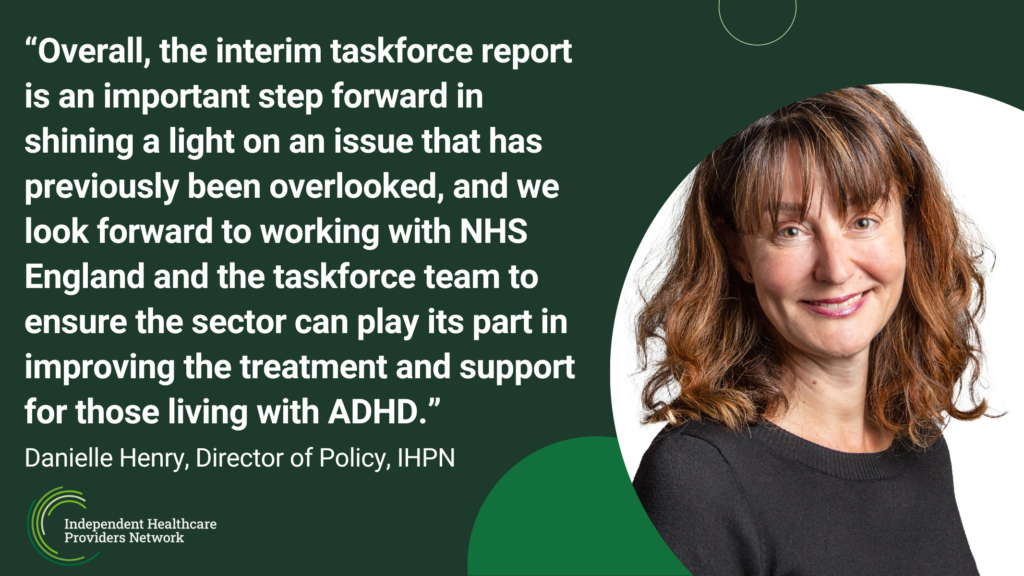
The future of ADHD assessment, diagnosis, and treatment services
27/06/2025
Last week NHS England’s independent ADHD Taskforce published their interim report as part of their work to look at how to improve care for people living with ADHD. With recent headlines showing an estimated 500,000+ people in England are awaiting an ADHD assessment – over ¼ quarter of whom have been waiting for two years or more – this report could not be more timely.
Independent providers play an important role in delivering both NHS and privately funded ADHD assessment, diagnosis, and treatment services – helping ensure hundreds of thousands of patients can get the care they need.
We very much welcome the taskforce’s report and in particular its recognition of:
- The current under-diagnosis and treatment of ADHD and the costs this has to both patients and their families, and the wider society
- The urgent need for local systems to address the growing backlogs across both children’s and adult services in line with its commitments on reducing waiting for diagnosis and treatment for physical health conditions.
- The importance of more support to be provided pre-diagnosis including those akin to “waiting well” initiatives for patients waiting for surgical operations.
- The current lack of national data collection on ADHD waiting lists, outcomes, diagnosis and treatment rates
- The need to digitalise ADHD services – both in terms of improving the administration and efficiency of services as well as the potential for NICE to assess digital products that can improve outcomes for ADHD management and treatment.
The devil is always in the detail though and some key areas in the report we will be looking to work with the Taskforce to discuss include:
Delivering more support pre-diagnosis – this is a real area of need but currently overlooked by NHS commissioners and any expansion would require proper funding mechanisms and a clearer understanding of the evidence base of “what works” in this area.
Moving to a more generalist model of care – this makes sense particularly with regards GPs taking on more ongoing prescribing responsibilities. However, diagnosis of ADHD, and working with patients to get the right dose of medication, requires specialist experience of mental health which must not be lost in the process.
Likewise, with regards a broadening NICE’s definition of a “specialist” when dealing with ADHD patients – it’s vital that those working in this area have demonstrable experience in mental health services, including working with those with complex presentations. Without this, quite simply, the risk of shortfalls in care and/or misdiagnosis increases significantly. Such a move to a more generalist/holistic model of care in the community should also be seen in the context of the pressures that NHS community mental health teams are currently under, having to integrate a huge number of priorities with often too few resources.
The report also makes reference to the growth in the use of “private providers that are not regulated, resulting in two-tier access to services, diagnosis and treatment…that drives health inequalities.”
As the membership body for independent providers of ADHD diagnosis and treatment, we are absolutely clear that all providers diagnosing ADHD – whether NHS or private – should be regulated by the CQC. Delivering safe, high quality, and effective care is the top priority for our members who comply not only with NICE guidance but also the UK Adult ADHD Network (UKAAN) – established to provide support, education, research and training for mental health professionals working with adults with ADHD, as well as The ADHD Assessment Quality Assurance Standard for Children and Teenagers (CAAQAS) which aims to address this by proposing a quality framework for ADHD assessments in this population.
Indeed, all patients – whether they are NHS or private – should be able to get the high quality diagnosis, care and support they need. This includes ensuring that all parts of the health and wider support system work together to support patients regardless of where they have been treated. Too often, our members are reporting seeing GPs refuse shared care prescribing agreements purely on the grounds the diagnosis has been made in a private service (including in some circumstances where that service is provided for the NHS under Right to Choose) – meaning patients have to be “re-diagnosed” in the NHS which can take over two years in many areas and place a huge toll on an individual and their family.
Overall, the interim taskforce report is an important step forward in shining a light on an issue that has previously been overlooked and we look forward to working with NHS England and the taskforce team to ensure the sector can play its part in improving the treatment and support for those living with ADHD.
